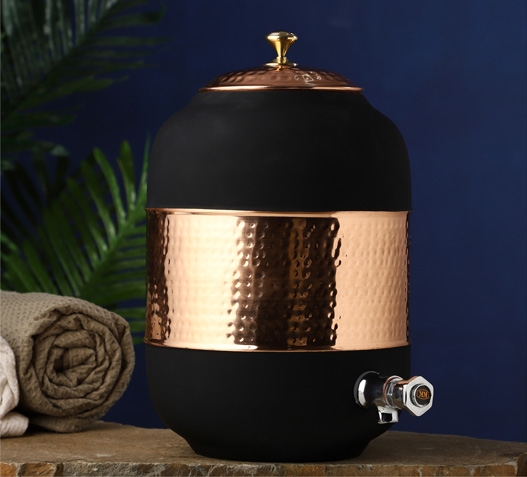Top Trends in Home Design Featuring Elegant and Useful Copper Products
Checking Out the Diverse Applications of Copper Products in Modern Industries
From improving the efficiency of electrical systems to playing a critical function in sustainable energy technologies, the flexibility of copper is obvious. As markets increasingly prioritize development and sustainability, the varied applications of copper call for a closer exam, particularly regarding their prospective effect on future ecological methods and technological innovations.
Electric Applications of Copper
Copper is a necessary material in the electric market, making up approximately 60% of the complete demand for non-ferrous steels globally - Copper Products. Its premium electrical conductivity, which is virtually two times that of aluminum, makes it the preferred choice for a large range of electric applications. From circuitry systems in commercial and property buildings to high-voltage power transmission lines, copper makes certain effectiveness and integrity in electricity delivery
Along with wiring, copper is essential to the production of electric parts such as motors, transformers, and generators. These components take advantage of copper's thermal conductivity and malleability, essential for warm dissipation and efficient performance. Copper's resistance to deterioration enhances the life expectancy and sturdiness of electrical systems, making it an economical service in the lengthy term.
The growth of eco-friendly power resources, such as solar and wind power, has additionally increased the need for copper in electric applications. As markets shift in the direction of sustainable energy services, copper's function becomes also much more essential. Generally, the versatility and efficiency characteristics of copper strengthen its status as a keystone product within the electrical field, driving innovation and performance throughout different applications.
Plumbing and Piping Solutions
In modern plumbing systems, the option of products dramatically affects both capability and durability. Copper has actually emerged as a preferred choice due to its special residential properties, consisting of deterioration resistance and antimicrobial attributes. These features make certain that copper piping stays risk-free and sturdy for moving safe and clean water, an essential factor to consider in property and commercial applications.
Among the essential benefits of copper in plumbing is its capacity to withstand high temperatures and pressures, making it ideal for a variety of applications, from warm water systems to home heating and cooling networks. Additionally, copper's versatility permits easier installment in intricate piping layouts, lowering the risk of failures and leaks.
Another noteworthy benefit is copper's lengthy life-span, frequently surpassing half a century with proper upkeep. This longevity not just decreases substitute costs however likewise adds to sustainable techniques by lowering waste. In addition, copper's recyclability lines up with contemporary ecological requirements, promoting a circular economy within the pipes market.
Copper in Renewable Resource
The convenience of copper expands past pipes applications, playing an important role in the renewable resource industry. Its excellent electric and thermal conductivity makes it an important material in the production and circulation of sustainable energy sources, particularly solar and wind power. In solar panels, copper is used in solar cells and electrical wiring, helping with efficient energy conversion and transmission. Its resistance to rust ensures long-lasting performance, which is essential for taking full advantage of energy outcome in time.

Additionally, as the global need for electric cars (EVs) increases, copper's role in battery systems and charging infrastructure comes to be even extra significant. The material's capability to carry out electrical energy efficiently is important to the performance click this site of EV batteries, improving array and billing speed.
Copper's Duty in Electronics
Electronics producing depends heavily on copper's extraordinary residential or commercial properties, especially its high electric conductivity and thermal performance. These qualities make copper an optimal choice for a broad range of digital parts, including connectors, circuit card, and circuitry. The metal's capability to successfully transfer electric signals makes certain minimal energy loss, which is critical in high-performance digital gadgets.
Moreover, copper's thermal conductivity plays a considerable function in warm dissipation, shielding sensitive components from overheating. This is particularly essential in contemporary electronic devices, where small layouts lead to enhanced warm generation. Copper is additionally favored for its pliability and ductility, enabling it to be conveniently formed into complex layouts that satisfy the needs of advanced digital applications.
With the increase of consumer electronic devices, telecoms, and electric lorries, the need for copper in the electronics field continues to grow. Thus, copper stays a foundation product in the ever-expanding field of electronics.
Innovative Uses in Production

One significant application is in additive manufacturing, where copper-based materials are utilized in 3D printing processes. This enables the development of lightweight components and complex geometries, especially in the aerospace and vehicle fields. Furthermore, copper's thermal conductivity makes it a perfect option for heat exchangers, improving effectiveness in commercial air conditioning systems.
Additionally, the surge of wise manufacturing has actually seen the unification of copper in IoT tools, where its conductive abilities support advanced sensing modern technologies. In the realm of renewable resource, copper is essential in the manufacturing of solar panels and wind generators, facilitating more efficient power conversion and circulation.
As sectors pursue sustainability and advancement, copper's versatility and performance continue to place it as a critical product, driving innovations in production and adding to the development of smarter, a lot more effective items.
Conclusion
The indispensable role of copper in sustainable energy and its vital feature in electronics underscore its value in progressing sustainable methods. Jointly, these applications highlight copper's vital contribution to technological progress and industrial effectiveness in contemporary culture.
From enhancing the efficiency of electric systems to playing an essential role in renewable energy technologies, the adaptability of copper is evident. As industries resource increasingly focus on advancement and sustainability, the diverse applications of copper call for a closer exam, particularly regarding their possible effect on future technological innovations and environmental practices.
The growth of eco-friendly power resources, such as solar and wind power, has actually better boosted the need for copper in electric applications. In general, the adaptability and efficiency attributes of copper solidify its status as a keystone product within the electric market, driving development and effectiveness across numerous applications.
The convenience of copper prolongs past pipes applications, playing a try this vital duty in the renewable power industry.